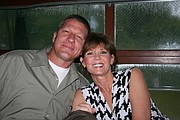CHARLESTON, S.C. (AP) - Booming cannons, plaintive period music and hushed crowds ushered in the 150th anniversary of America's bloodiest war on Tuesday, a commemoration that continues to underscore a racial divide that had plagued the nation since before the Civil War.
The events marked the 150th anniversary of the Confederate bombardment of Union-held Fort Sumter in Charleston Harbor, an engagement that plunged the nation into four years of war at a cost of more than 600,000 lives.
Several hundred people gathered on Charleston's Battery in the pre-dawn darkness, much as Charleston residents gathered 150 years ago to view the bombardment of April 12, 1861.
About 4 a.m., a single beam of light reached skyward from the stone works of Fort Sumter. About a half hour later, about the time the first shots were fired, a second beam glowed, signifying a nation torn in two.
Nearby, a brass ensemble played a concert titled "When Jesus Wept" as hundreds listened, some in folding chairs, others standing.
Fifty years ago during the centennial of the Civil War, there was a celebratory mood. But on Tuesday, the 150th anniversary events were muted. Even the applause seemed subdued.
Of about 1,200 people attending two main commemorative events, only a handful were black. One man whose Confederate ancestor is credited with firing the first shot of the war acknowledged his family legacy as a "mixed blessing."
"I think it signifies the mood of the nation. I think we're much more sensitive to other people and the diversity in this country," said Linda Marshall, a 58-year-old registered nurse from Charleston as she waited for the second beam of light as dawn creeped up.
A little over two hours later, as a red sun rose on James Island across the harbor, Confederate re-enactors fired an authentic 1847 seacoast mortar, signaling about 30 other cannons ringing the harbor.
Those cannons quickly thumped and smoke rose in a re-enactment of the Sumter bombardment.
Sumter fell after a 34-hour bombardment.
One of those on hand on James Island was John Hugh Farley of Roswell, Ga. Many historians credit Farley's ancestor, Lt. Henry Farley, as firing the first shot at Sumter.
"It's a real big honor. We are very proud of our family," said Farley, who had two other ancestors fight for the South. "It certainly is a mixed blessing because it's bringing back a memory from way back but it also helps us to look at history and learn from history."
Later in the morning, Danny Lucas, 53 and black, was walking out after visiting Charleston's Old Slave Mart Museum, where the history of Charleston's role as an urban slave trading center is recounted.
"I have no problem with the Civil War being honored as long as it is inclusive," said Lucas, a Ridgeland, S.C. resident. "I don't think whites should be so defensive and I don't think blacks should feel they are unwelcome to these kinds of things. I think it will fade over time."
State Sen. Glenn McConnell, president pro tempore of the South Carolina Senate and a Civil War re-enactor, told the audience of about 700 on James Island that the effects of the war are still being felt.
"The War Between the States triggered generations of disputes and controversies between regions, races and cultures," he said.
"Why was the war fought? Was it about slavery or states' rights? What does the Confederate battle flag stand for? Is it a symbol of bigotry or a memorial to the valor of fallen soldiers," he asked about 700 people gathered at a ceremony commemorating the first shots of the war. "Many of the emotional issues still rage."
He said the South has moved on and "the time has come to move beyond the petty disputes of the past."

